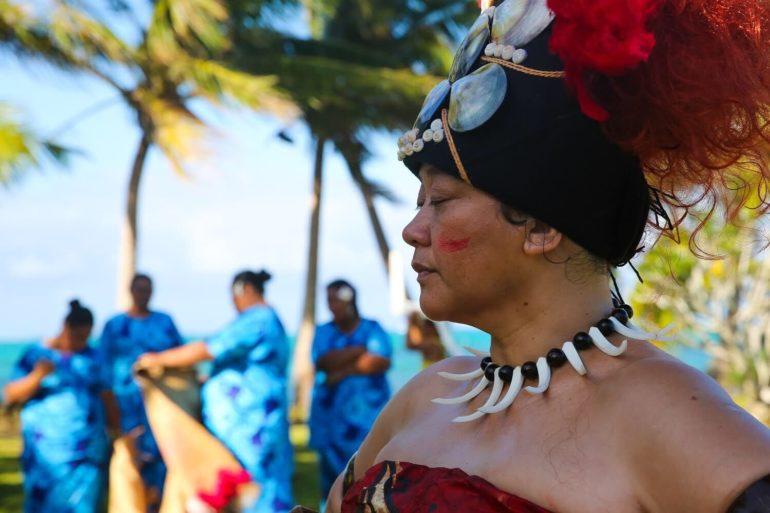Film Review: ‘Vai’
By Dennis Harvey
LOS ANGELES (Variety.com) – Most portmanteau features are potluck. But “Vai” has a lovely consistency of style and content that heightens the accessibility of its unique value as a combined effort among eight native female directors from eight different Pacific Island cultures. The task of each writer-helmer was to create a 10-minute vignette from a fictive woman’s life, each segment advancing a decade or so forward, deploying a single continuous shot where possible.
The result is neither straightforward narrative nor polemical abstract, but instead an aesthetically pleasing meditation on womanhood and vanishing traditions — in places where those things have been under siege from various forms of colonialism for hundreds of years. Though offshore commercial prospects will be limited (Vendetta Films is releasing in New Zealand and Australia), this is a natural choice for festival and educational programmers seeking input from cinematically underrepresented communities.
“Vai” doesn’t really pretend to be the story of a single character — in fact, the leading figures in these segments often have names that are variations on “Vai.” But taken together, they form a sort of composite of female experience in cultures where family separation for the sake of work or education has often been the norm, and the cultures themselves are in constant danger of being assimilated out of existence. In Nicole Whippy’s opening section, co-written with her sister Sharon, a 7-year-old Vai (Mereani Tuimatanisiga) resists having to leave Fiji with her pregnant mother, leaving a doting grandmother and all other relatives behind.
At 13, the protagonist, now played by ‘Ar-Ramadi Longopoa in ‘Ofa-Ki-Levuka Guttenbeil-Likiliki’s Tongan segment, is already a beast of burden, begging water from neighbors for a nana’s healing practices, dreaming of becoming a singer like her heroine, Indira Moala (a “New Zealand Idol” finalist making a cameo appearance here). Later, the mother who’s already moved elsewhere at this point surfaces to counsel the angry, sullen 16-year-old protag (Betsy Luitolo) fishing off the Solomon Islands coast. But in this more contained, intimate two-hander by Matasila Freshwater, mom may simply be a figment of a distraught teen’s imagination.
At 21 (Agnes Pele), our heroine is cracking under the pressure of being a “model native student” at a university in Auckland while having to work full time and care for an ailing father. Chided for falling behind by a professor, she protests, “My dad, my family, my village has sacrificed so much for me to be here” at the climax of Amberley Jo Aumura’s complexly camera-choreographed sequence.
The remaining episodes have a more ceremonial feel. On Rarotonga (the most populous of the Cook Islands), a 30-year-old Vai (Evotia-Rose Araiti) emerges from the sea to confront the latest corporate representative offering locals short-term rewards for long-term environmental damage. Then, a fortysomething protagonist (Fiona Collins) returns to Samoa where she must reluctantly lead a parade of homage to the doorstep of a Christian church. At 64 (Maliaga Erick), she’s now attempting to persuade a granddaughter that leaving the tiny nation-isle of Niue (population 1,600) represents her own best chance at improving the future of the entire community.
Directed by Miria George, Marina Alofagia McCartney and Maliaga Erick, respectively, these three segments grow a bit repetitious back-to-back, as each involve a sort of procession, as well as traditional song and dance. Becs Arahanga’s closing sequence finds an octogenarian sage (Hinetu Dell) passing the baton to yet another generation by performing a sacred rite for her infant great-granddaughter on Maori tribal land in New Zealand.
With the same primary crew apparently working on every episode, “Vai” does not lurch about stylistically, even though staging demands run the gamut. Drew Sturge’s widescreen cinematography sports an often eye-popping tropical color palette enhanced further by Lindah Lepou’s costume designs. The fluid choreography of camera and actor movement often recalls the work of late, great Hungarian long-take maestro Miklós Jancsó, not least in the way that the sometime awkwardness of inexperienced performers (many here are non-pros making their screen debut) is somehow excused by being part of an elaborate, terpsichorean rite.
There’s never a sense of empty spectacle, however, as a steady undercurrent of historical loss and sacrifice runs throughout action that otherwise ranges widely between the realistic and allegorical. In look as well as sound (Lauren King contributes an attractive original score), “Vai” very much captures the paradisiacal aspects of South Seas island life that have enraptured arrivistes for centuries. But without resorting to explicit political rhetoric, this handsome collaboration never lets us forget that the toll exacted on native peoples by such outsiders has been great.

